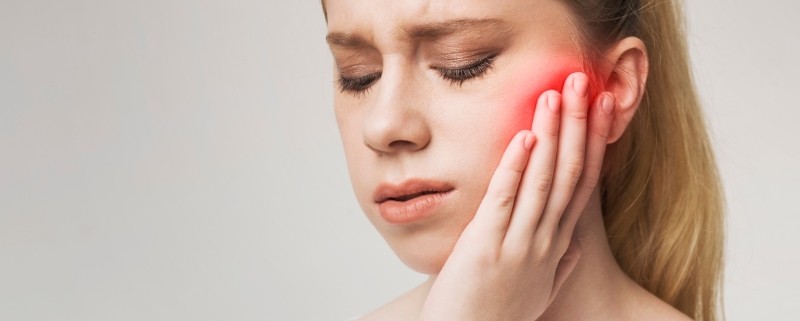Jaw Pain Relief for TMJ Pain
Teeth grinding, tight clenching and constant contact between your upper and lower teeth all put stress on the temporomandibular joint, also referred to as the TMJ. These two joints connect your lower jaw to your skull. Jaw discomfort, tightness, facial pain, headaches, earaches and neck stiffness are all possible symptoms leading to TMJ.
Joint anatomy: The TMJ is a very busy, constantly used joint. You have two joints located on both sides of your head, at the front of your ears. The TMJ acts as both a hinge and sliding joint and includes a small disk that acts as a shock absorber.
Masseter: Most powerful jaw muscle in mastication (chewing). This muscle lifts your jaw and closes your mouth.
Pterygoid Muscles: Lateral and medial pterygoid muscles are involved in jaw lifting, mouth closing and sliding your jaw forward or side to side.
Temporalis Muscle: The temporalis muscle which runs from the temporal bone (each side of the head to the bony part of the lower jaw) is the muscle involved in crushing and grinding food.
When the TMJ disk erodes or the joint cartilage is damaged by arthritis or trauma, pain can arise in that spot. Dental problems like an incorrect bite can play into TMJ issues as well. Because the TMJ muscle, nerves and bone are all connected through the face and body, TMJ problems may have a wide range of cause and effects.
TMJ related symptoms:
- Pain while chewing – tight jaw muscles
- Tell-tale signs – clicking and/or popping sounds
- Ear pain – because the joint sits in front of the ear, it causes pain in and around the ear and possibly down the neck if severe enough.
- Headaches – morning headaches can result from clenching or grinding at night. Tension headaches occur in people with TMJ disorders.
Early reminders for TMJ problems
Early detection of TMJ issues is essential in recognizing the problem and being able to aid in the pain before it becomes worse or does permanent damage. Warm compresses over the joint will help relieve the pain or discomfort in the area. Compresses should be left on for no more than twenty minutes at a time. Targeted exercises and physical therapy can also help with tension relief. Gentle jaw opening and closing exercises help stretch the muscles. Sliding the jaw back and forth also helps with stretching the muscle as well. Pain management with such over the counter medications such as Tylenol and Ibuprofen can also help. Your doctor might want to consider making you a customized occlusal guard. Occlusal guards are a removable appliance you wear while sleeping. An occlusal guard provides a cushion between your upper and lower teeth to prevent grinding. Occlusal guards also encourage the jaw muscle to relax giving you a more restful night of sleep.
If you find that you are waking up to aches and pains, it might be a sure sign that you are grinding or clenching your teeth at night. At Smile Sarasota, Dr. Still is able to make you a custom mouth guard that fits your mouth along with a variety of different techniques to help alleviate the pain and stress of tooth-on-tooth damage.




